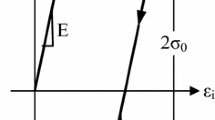Abstract
In the present paper, fatigue tensile tests are carried out on a servo-hydraulic fatigue testing machine to study the whole propagation process of the inclined crack. And the scanning electron microscope is employed to observe the micromorphology of the fracture surface to further probe the crack growth rate from a microscopic point of view. Meanwhile, the finite element method has also been applied to predict the crack propagation trajectory and the fatigue life of the sample with two finite element analysis codes. The fatigue tensile tests indicate the inclined crack propagates along the direction perpendicular to the external loading and the crack growth rate increases continuously based on the micromorphology of the fracture surface. The numerical analysis results reveal the variation of the stress distribution at the crack tip as well as the crack trajectory at different extension steps. Moreover, the stress intensity factor values are discussed in detail. And the computed results, the inclined crack propagation path and fatigue life of the sample, agree well with the experimental ones, which provide certain referential significance for the prediction of the inclined crack propagation in thin plate.












Similar content being viewed by others
References
S. Boljanović, S. Maksimović, Mixed mode crack growth simulation with/without overloads. Int. J. Fatigue 67, 183–190 (2014)
S. Boljanović, S. Maksimović, Computational mixed mode failure analysis under fatigue loadings with constant amplitude and overload. Eng. Fract. Mech. 174, 168–179 (2017)
M. Benedetti, M. Beghini, V. Fontanari, B. Monelli, Fatigue cracks emanating from sharp notches in high-strength aluminum alloys: the effect of loading direction, kinking, notch geometry and microstructure. Int. J. Fatigue 31, 1996–2005 (2009)
H. Alihosseini, K. Dehghani, Modeling and failure analysis of a broken railway axle: effects of surface defects and inclusions. J Fail. Anal. Prev. 10, 233–239 (2010)
A.A. Griffith, The phenomena of rupture and flow in solids. Philos. Trans. R. Soc. Lond. A 221, 163–198 (1921)
G.R. Irwin, Fracture dynamics, in Fracturing of metals seminar (American Society for Metals, Cleveland, 1948), pp. 147–166
G. Fu, W. Yang, C.Q. Li, Stress intensity factors for mixed mode fracture induced by inclined cracks in pipes under axial tension and bending. Theor. Appl. Fract. Mech. 89, 100–109 (2017)
V.N. Shlyannikov, Fatigue crack paths for inclined cracks and surface flaws under biaxial loading. Eng. Fract. Mech. 77, 1772–1780 (2010)
W. Zhang, H. Liu, Q. Wang, J. He, A fatigue life prediction method based on strain intensity factor. Materials 10, 689 (2017)
I.S. Raju, J.C. Newman Jr., Three dimensional finite-element analysis of finite-thickness fracture specimens. Report, NASA TN D-8414 (1977)
T. Sang, D. Kim, A. Tadjiev, T.Yang Hyun, Fatigue life prediction under random loading conditions in 7475-T7351 aluminum alloy using the RMS model. Int. J. Damage Mech. 15, 89–102 (2006)
X.F. Hu, W.A. Yao, A new enriched finite element for crack growth. Int. J. Fatigue 48, 247–256 (2013)
E. Poursaeidi, H. Bakhtiari, Fatigue crack growth in a first stage of compressor blade. Eng. Fail. Anal. 45, 314–325 (2014)
X. Zhang, L. Li, X. Qi, J. Zheng, X. Zhang, Experimental and numerical investigation of fatigue crack growth in the cracked gear tooth. Fatigue Fract. Eng. M 40, 1037–1047 (2017)
S. Huang, J.Z. Zhou, J. Sheng, K.Y. Luo, J.Z. Lu, Effects of laser peening with different coverage areas on fatigue crack growth properties of 6061-T6 aluminum alloy. Int. J. Fatigue 47, 292–299 (2013)
S.B. Narasimhachary, K.S. Bhachu, S.R. Shinde, P.W. Gravett, J.C. Newman, A single edge notch specimen for fatigue, creep-fatigue and thermo-mechanical fatigue crack growth testing. Eng. Fract. Mech. (2017). https://doi.org/10.1016/j.engfracmech.2017.08.011
R.S. Christopher, Uncertainty quantification in crack growth modeling under multi-axial variable amplitude loading, Doctor’s Thesis, Vanderbilt University, Nashville, 2010
NASA, Fatigue crack growth computer program NASGRO version 3.0-Reference manual, JSC-22267B, Lyndon B. Johnson Space Center, Texas (2000)
Acknowledgments
The work was sponsored by the National Natural Science Foundation of China (Nos. 51675002, 51175002), National Natural Science Foundation of Anhui Province (No. 1708085ME110), Natural Science Foundation of Colleges and Universities in Anhui Province (Nos. KJ2016A813, KJ2016A806) and the Graduate Innovation Research Foundation of Anhui University of Technology (No. 2016073).
Author information
Authors and Affiliations
Corresponding author
Rights and permissions
About this article
Cite this article
Wang, J., Zhang, XQ., Wei, W. et al. Investigation of Fatigue Growth Behavior of an Inclined Crack in Aluminum Alloy Plate. J Fail. Anal. and Preven. 18, 1159–1167 (2018). https://doi.org/10.1007/s11668-018-0503-8
Received:
Revised:
Published:
Issue Date:
DOI: https://doi.org/10.1007/s11668-018-0503-8




